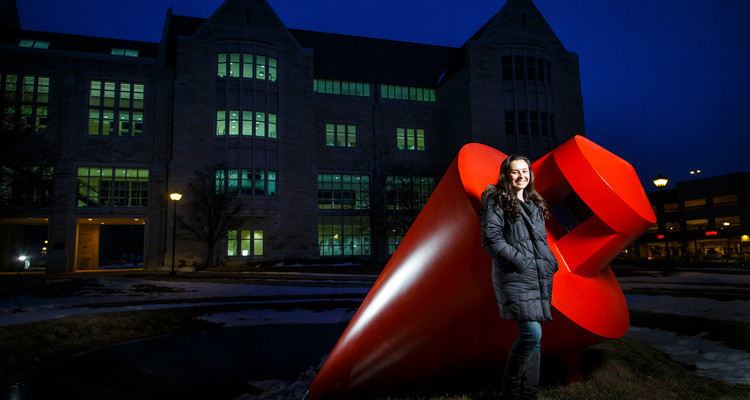Mechanical engineering student Lauren Vallez had some tough decisions to make this month. She recently was awarded a National Science Foundation Graduate Research Fellowship, an extremely competitive fellowship that recognizes and supports outstanding graduate students who are pursuing research-based master's and doctoral degrees in science, technology, engineering and mathematics (STEM) or in STEM education. Although she applied and was accepted into nearly all of the graduate programs she applied for last fall, the United States government-sponsored NSF fellowship will unofficially earn her placement into her pick of programs.
Vallez narrowed her sights onto three of the country's top engineering programs and recently selected Stanford University.
As an NSF fellow, Vallez will receive three years of financial support and will be granted all of the academic opportunities afforded to NSF graduate research fellows for five years as she pursues a Ph.D. The fellowship was created to help ensure the vitality and diversity of the scientific and engineering workforce in the United States and is awarded in a highly competitive and stringent application process to individuals who have demonstrated their potential for significant research achievement in STEM or STEM education.
Despite her numerous publication credits and article citations, all of which were co-written under the advisement of School of Engineering professor John Abraham, Ph.D., and St. Thomas engineering graduate student Brian Plourde, Vallez was "shocked" to learn she'd received the fellowship.
"I didn’t know anything coming in as an undergrad about working on research or publishing journal papers," Vallez said. "I‘m certain I wouldn’t have had the same opportunities if I had gone to a larger school. They had so much time to spend with me here."
Fellowship reviewers were impressed with the numerous papers and articles (including this one published in the March 2014 Guardian) Vallez co-wrote with Abraham and Plourde, which together received more than 30 citations. (The School of Engineering's Brittany Nelson-Cheeseman, Ph.D., also was a co-author on one of the papers.) In her application, she also was required to submit a personal statement, a description of her research experiences, a short research proposal about something she might like to work on in graduate school, as well as transcripts and letters of recommendation.
Vallez plans to focus in thermal sciences, a topic Abraham introduced her to (and was mentioned in a 2015 Newsroom article on Vallez's unlikely, colorful and globe-trotting path toward declaring herself an engineering major) but is undecided if her direction will steer her toward the medical field or toward energy. Ideally, she'd like to work with a professor who works in both fields.
Although she is looking forward to graduate school, she is going to miss the professors she has worked with.
"It was so easy to ask for recommendation letters because I personally know all the professors I have taken classes from. I cannot stress enough how much John and Brian have helped prepare me for this next phase of my education," Vallez said. "I would not have had the same research experience I mentioned in my NSF application had I not met them."
Vallez isn't the only St. Thomas student to receive this fellowship. Rachel Gehlhar '16, a mechanical engineering alumna, received an honorable mention her senior year. While a graduate student at Georgia Institute of Technology, she applied again and was awarded a Graduate Research Fellowship this year. Recently Gelhar accompanied her Georgia Tech adviser (Dr. Aaron Ames '01) to the California Institute of Technology, where she is a first-year Ph.D. candidate in mechanical engineering and is doing research on a prosthesis project. She works in the Cal Tech's Amber Lab, headed by Ames, which is devoted to theoretical and experimental research in bipedal robotics, locomotion, nonlinear and hybrid systems and prosthetic design.







